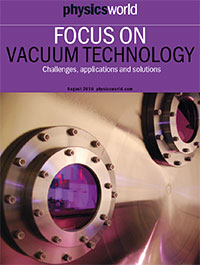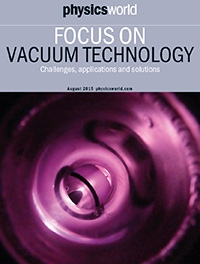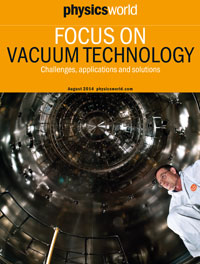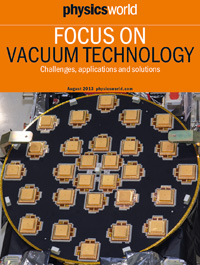Tag archives: vacuum technology
Physics World 2016 Focus on Vacuum Technology is out now
 By Matin Durrani
By Matin Durrani
I’m pleased to say that the latest focus issue of Physics World, which explores the many fascinating applications of vacuum science and technology, is now out.
Plasma processing is a strong theme this year, as we discover why tools and techniques developed as part of the boom in semiconductor fabrication are now benefiting biomaterials. Elsewhere, we reflect on the strengths of the vacuum community with outgoing IUVSTA president Mariano Anderle.
And, as always, this vacuum focus issue provides a great chance to catch up with major industry players, including Pfeiffer Vacuum, Agilent, Honeywell and Edwards, to examine the latest instrument upgrades and trends across the sector.
View all posts by this author | View this author's profile
Physics World 2015 Focus on Vacuum Technology is out now
By Hamish Johnston

Fusion power, redefining the kilogram and mimicking the Martian surface are three exciting areas of science and technology that are benefiting from the latest vacuum equipment. In our latest Focus on Vacuum Technology, which you can read free of charge, Christian Day of the Karlsruhe Institute of Technology in Germany explains how new pumping technologies will be crucial to the successful operation of future fusion power plants. “Proving the power of fusion” focuses on the extraordinary vacuum challenges facing the designers of the planned DEMO reactor, which is expected to generate 2 GW of electrical power by the mid-2030s.
Today, the kilogram is defined in terms of a cylinder of a platinum–iridium alloy that was made in the 1880s. Metrology has moved on since then and all of the other SI base units are now defined in terms of fundamental constants. In “The kilogram’s constant struggle”, Stuart Davidson and Ian Robinson of the National Physical Laboratory in Teddington, UK, explain how vacuum technology is playing a crucial role in the development of new ways of defining the kilogram, one of which will ultimately be chosen as the new global standard.
View all posts by this author | View this author's profile
Physics World 2014 Focus on Vacuum Technology is out now
By Matin Durrani
Vacuum technology is big business these days, with companies in the sector producing advanced scientific equipment that is vital not only for academic research, but also for manufacturers in other industrial sectors.

In fact, one giant of the vacuum industry – Swedish firm Atlas Copco – bought its UK rival Edwards Vacuum for an eye-watering $1.5bn last year.
If you want to find out more about why Atlas Copco forked out so much cash, don’t miss the latest Physics World focus issue on vacuum technology, which includes an interview with Geert Follens, president of Atlas Copco’s newly created vacuum-solutions division. In the interview, Follens discusses the takeover in more detail and explains why he expects further strong growth in the vacuum market.
Elsewhere in the issue, you can read about a European Union project uniting academia and industry to improve vacuum metrology for production environments. Such efforts are vital even in the drinks industry, where the Van Pur brewery in Poland, for example, uses equipment from KHS Plasmax to coat the inside of bottles with an ultrathin layer of glass using plasma impulse chemical vapour deposition under vacuum.
View all posts by this author | View this author's profile
Physics World 2013 Focus on Vacuum Technology is out now
By Matin Durrani
What would happen if the global positioning system (GPS) were suddenly to stop working or be switched off? A lot more than a few wrong turns during a car journey, that’s for sure.
With so much technology relying on GPS, which is owned and operated by the US, it’s vital that alternative global satellite-navigation systems enter service. Thankfully, Europe’s Galileo system, currently in production in the UK, will be fully operational by the end of the decade. It will also be more accurate than GPS, which could lead to a host of novel applications.
But what’s interesting for physicists is that Galileo would not be possible without advanced vacuum engineering and testing – as you can find out in our new focus issue of Physics World on vacuum technology.
